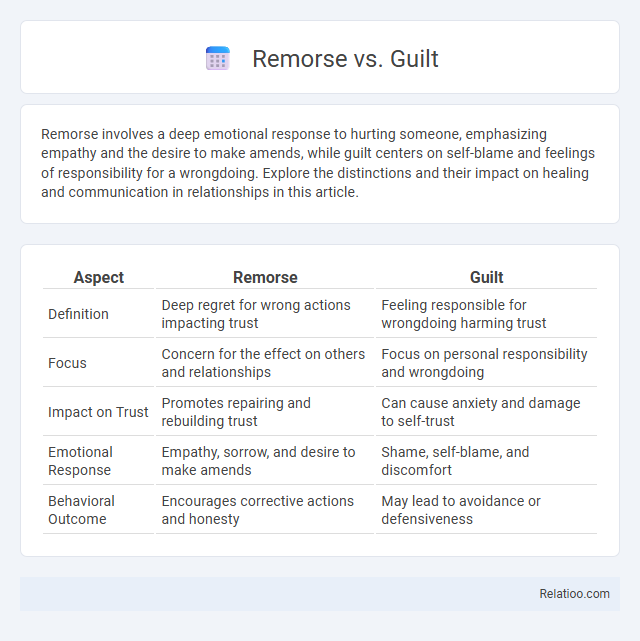Remorse involves a deep emotional response to hurting someone, emphasizing empathy and the desire to make amends, while guilt centers on self-blame and feelings of responsibility for a wrongdoing. Explore the distinctions and their impact on healing and communication in relationships in this article.
Table of Comparison
| Aspect | Remorse | Guilt |
|---|---|---|
| Definition | Deep regret for wrong actions impacting trust | Feeling responsible for wrongdoing harming trust |
| Focus | Concern for the effect on others and relationships | Focus on personal responsibility and wrongdoing |
| Impact on Trust | Promotes repairing and rebuilding trust | Can cause anxiety and damage to self-trust |
| Emotional Response | Empathy, sorrow, and desire to make amends | Shame, self-blame, and discomfort |
| Behavioral Outcome | Encourages corrective actions and honesty | May lead to avoidance or defensiveness |
Understanding Remorse and Guilt
Understanding remorse and guilt involves recognizing that guilt typically arises from the awareness of having done something wrong, focusing on the action itself, while remorse encompasses a deeper emotional response that includes empathy and a desire to make amends. Your ability to differentiate these emotions can lead to more effective personal growth, as guilt may prompt accountability, but remorse drives meaningful change and reconciliation. Both emotions play critical roles in moral development, yet remorse reflects a more profound, often transformative, self-reflection beyond the mere acknowledgment of guilt.
Defining Remorse: Core Characteristics
Remorse is a deep emotional response reflecting sincere regret and sorrow for causing harm or wrongdoing, often accompanied by a desire to make amends. It differs from guilt, which is primarily a cognitive awareness of having violated a moral standard. Your understanding of remorse involves recognizing its profound sense of empathy and personal responsibility beyond mere guilt.
What is Guilt? Key Features Explained
Guilt is a self-conscious emotion arising from the belief that one has violated a moral standard or caused harm, often leading to feelings of responsibility and regret. Key features of guilt include recognition of wrongdoing, a desire to make amends, and a focus on specific actions rather than personal identity. Unlike remorse, which involves a deeper emotional response and empathy for the affected party, guilt primarily motivates corrective behavior to restore moral equilibrium.
Psychological Differences Between Remorse and Guilt
Remorse involves a deep emotional response to one's wrongdoing, reflecting empathy and a desire to make amends, while guilt is a cognitive recognition of having violated moral or social standards. Psychologically, remorse is associated with personal accountability and motivates corrective behavior, whereas guilt may result in feelings of self-reproach without necessarily leading to change. Understanding these distinctions clarifies how individuals process ethical violations and regulate their behaviors.
Origins and Causes of Remorse vs Guilt
Your experience of remorse stems from recognizing the negative impact of your actions on others, often accompanied by empathy and a desire to make amends. Guilt arises from an internal acknowledgment of violating personal or societal moral standards, originating in learned cultural, familial, or religious norms. While both emotions are linked to wrongdoing, remorse focuses on emotional connection and regret for harm caused, whereas guilt centers on perceived rules broken and personal accountability.
Emotional Impact: How Remorse and Guilt Affect Us
Remorse and guilt both deeply influence your emotional state, but remorse often leads to a stronger, more lasting sense of sorrow and a desire to make amends, while guilt typically triggers feelings of responsibility and regret. The emotional impact of remorse can drive significant personal growth and behavioral change, as it is closely linked to empathy and self-reflection. Guilt, on the other hand, can either motivate corrective action or contribute to anxiety and stress when unresolved.
Expressions: How We Show Remorse vs Guilt
Expressions of remorse often involve sincere apologies, visible emotional distress, and a genuine desire to make amends, signaling deeper empathy and accountability. Guilt typically manifests as internal feelings of self-blame or discomfort, sometimes accompanied by subtle signs such as avoidance or withdrawal rather than overt expressions. Understanding these differences can help you recognize whether someone is truly remorseful or merely experiencing guilt, guiding your response appropriately.
Role in Relationships: Healing and Harm
Remorse involves a genuine emotional response to wrongdoing that fosters healing by encouraging personal accountability and sincere apologies, thereby strengthening Your relationships. Guilt, often characterized by feelings of responsibility mixed with anxiety, can motivate corrective actions but may also cause harm if it leads to excessive self-blame or avoidance. Unlike guilt, remorse deeply connects emotional regret with empathy, enabling meaningful reconciliation and trust restoration in interpersonal dynamics.
Overcoming Remorse and Guilt: Effective Strategies
Overcoming remorse and guilt requires acknowledging your emotions and identifying their sources to prevent them from controlling your well-being. Techniques such as cognitive restructuring, mindfulness meditation, and seeking professional counseling can help you reframe negative thoughts and foster self-compassion, leading to emotional healing. Practicing forgiveness toward yourself and others accelerates recovery by reducing emotional burden and enhancing mental clarity.
Remorse vs Guilt: Key Takeaways
Remorse involves a deep emotional response and a desire to make amends for wrongdoings, highlighting personal accountability and empathy. Guilt is a cognitive recognition of having violated moral standards or caused harm, often driving corrective behavior. Understanding the distinction between remorse and guilt is crucial for emotional healing and ethical decision-making.

Infographic: Remorse vs Guilt
 relatioo.com
relatioo.com